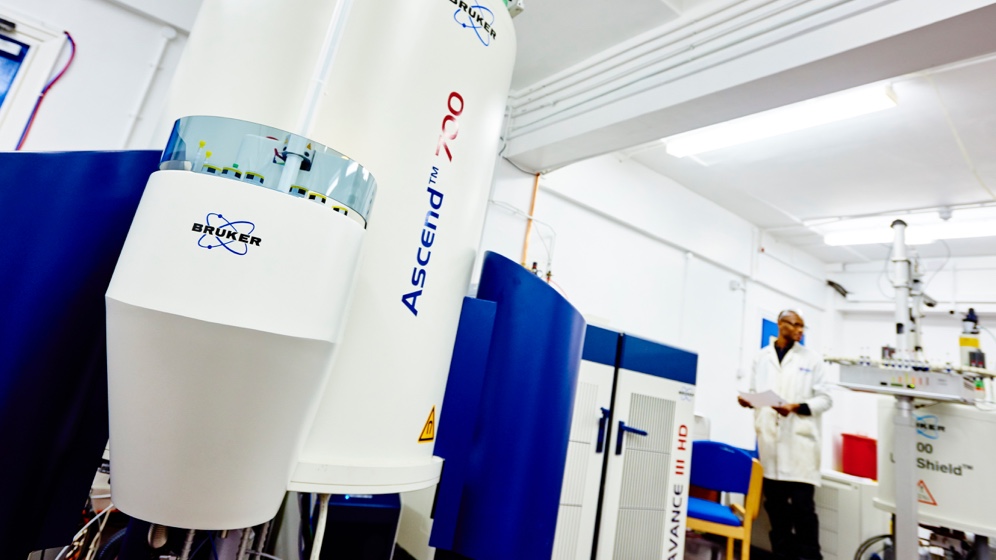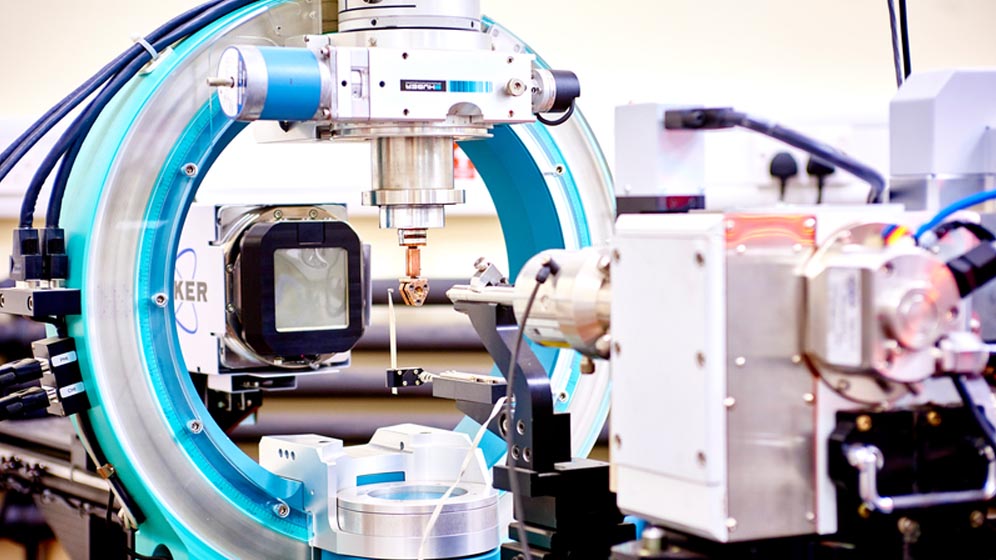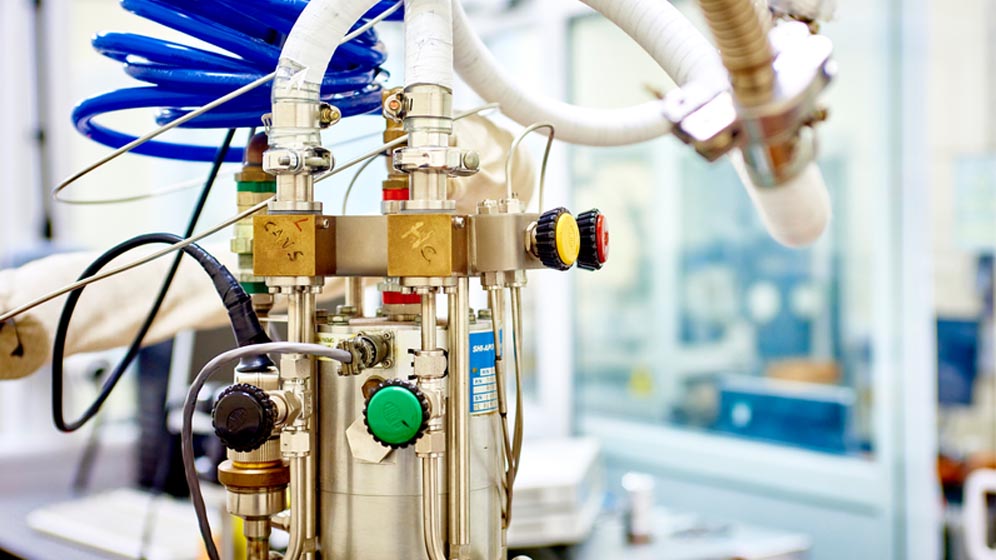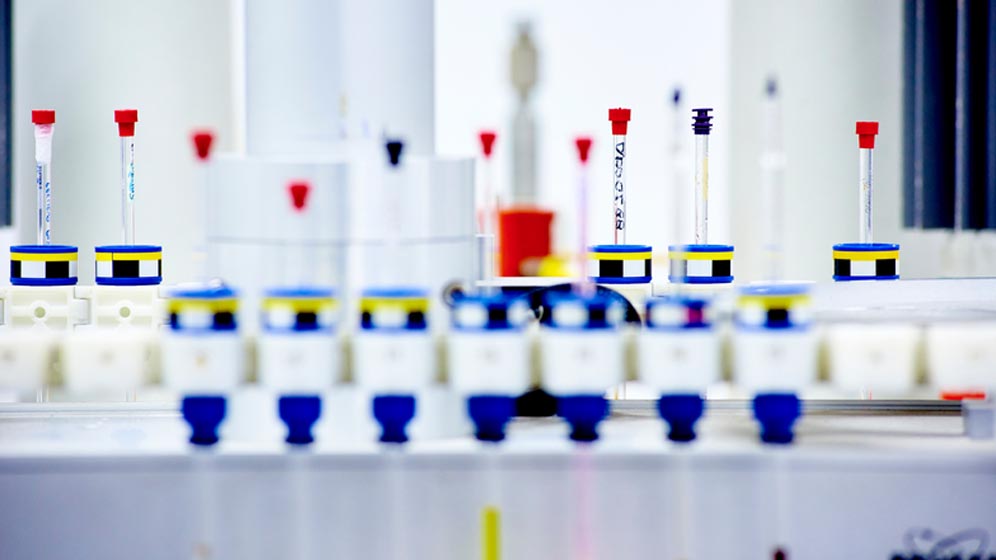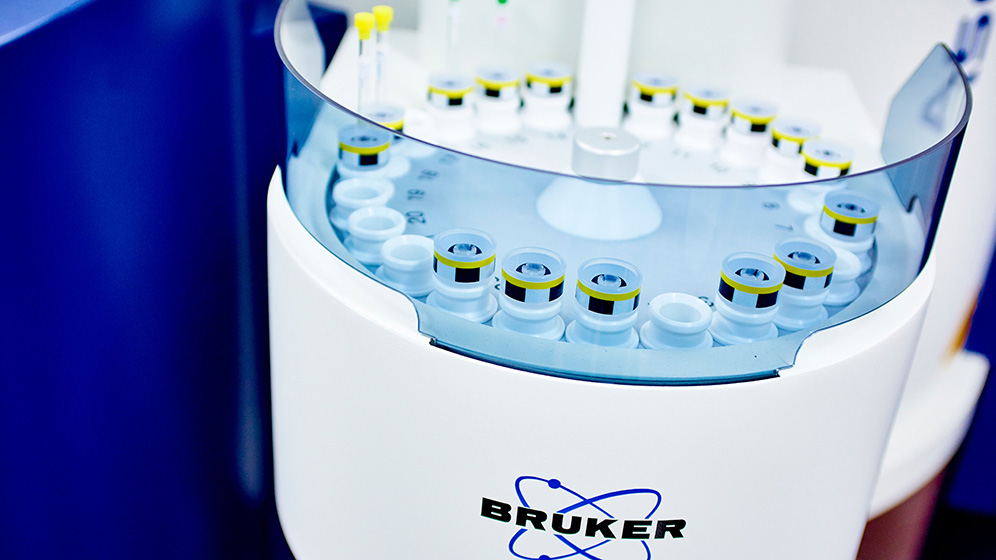Chemistry with Medicinal Chemistry BSc Honours
- UCAS code: F151
- Full time
- 3 years
Our professionally accredited BSc degree focuses on the key aspects of chemistry that are most relevant and sought after by the pharmaceutical industry.
You are currently viewing course information for entry year: 2026
Next start date:
- September 2026
UCAS Institution name and code:
- NEWC / N21
Course overview
Medicinal chemistry is the discovery, design and synthesis of new clinical drugs and medicines.
This exciting degree allows you to broaden your interests as you discover the subject. It includes the option to spend a year studying abroad or working in industry.
You’ll explore the role of chemistry in:
- drug design
- cancer chemotherapy
- enzymology
- toxicology
You'll study medicinal, organic, inorganic and structural chemistry. You'll investigate modern analytical techniques and computational chemistry.
Sorry, you need JavaScript to view this video
Your course and study experience - disclaimers and terms and conditions
Please rest assured we make all reasonable efforts to provide you with the programmes, services and facilities described. However, it may be necessary to make changes due to significant disruption, for example in response to Covid-19.
View our Academic experience page, which gives information about your Newcastle University study experience for the academic year 2025-26.
See our terms and conditions and student complaints information, which gives details of circumstances that may lead to changes to programmes, modules or University services.
Additional information
Flexible degree structure
Our Chemistry degrees share a common first year before offering different pathways and opportunities to specialise. Explore what you enjoy and then branch out.
Quality and ranking
Professional accreditation and recognition
All professional accreditations are reviewed regularly by their professional body.
Modules and learning
Modules
The information below is intended to provide an example of what you will study.
Most degrees are divided into stages. Each stage lasts for one academic year, and you'll complete modules totalling 120 credits by the end of each stage.
Our teaching is informed by research. Course content may change periodically to reflect developments in the discipline, the requirements of external bodies and partners, and student feedback.
Optional module availability
Student demand for optional modules may affect availability.
Full details of the modules on offer will be published through the Programme Regulations and Specifications ahead of each academic year. This usually happens in May.
To find out more please see our terms and conditions
Our chemistry degrees share a common first year which explores the fundamentals of organic, inorganic, physical and biological chemistry.
Modules
Additional compulsory module information
| Optional Modules | Credits |
|---|---|
| Mathematical Skills for Science | 10 |
| Introduction to Scientific Computing for Chemists | 10 |
| Introductory Astrophysics | 10 |
You'll explore concepts in medicinal chemistry including pharmacokinetics, pharmacodynamics, enzymes and drug design. You’ll be introduced to structure-based drug design using CCP4 Molecular Graphics software.
You'll take an employability module that includes a Professional Awareness Event. You'll have the opportunity to interact with a range of companies.
Modules
| Compulsory Modules | Credits |
|---|---|
| Sustainable Solutions | 10 |
| Chemical Laboratory Skills 2 | 20 |
| Structural Chemistry | 10 |
| Organic Chemistry | 20 |
| Inorganic Chemistry | 20 |
| Physical Chemistry | 20 |
| Medicinal Chemistry | 10 |
| Optional Modules | Credits |
|---|---|
| Applied Computational Medicinal Chemistry | 10 |
| Chemistry of the Atmosphere | 10 |
You'll discover more advanced concepts in medicinal chemistry including toxicology, enzymology, cancer chemotherapy and chemotherapy of infectious diseases.
You'll study advanced organic and inorganic chemistry and explore topics including chemical nanoscience, synthesis and bioinorganic chemistry.
You'll take an employability module that includes a Professional Awareness Event. This is a great opportunity to interact with a range of companies.
Modules
We base these figures and graphs on the most up-to-date information available to us. They are based on the modules chosen by our students in 2024-25.
Teaching time is made up of:
- scheduled learning and teaching activities. These are timetabled activities with a member of staff present.
- structured guided learning. These are activities developed by staff to support engagement with module learning. Students or groups of students undertake these activities without direct staff participation or supervision
Teaching and assessment
Teaching methods
Teaching is by a combination of lectures, tutorials and lab-based and computational experiments. You will have practical classes for two afternoons each week in Stage 1 and these increase in later years.
Assessment methods
You'll be assessed through a combination of:
-
Assessments
-
Assignments – written or fieldwork
-
Coursework
-
Examinations – practical or online
-
Group work
-
Practical sessions
-
Presentations
-
Seminar tasks/exercises
Skills and experience
Practical skills
You'll have the opportunity to develop professional laboratory skills through practical experience in our high-spec teaching labs.
You'll also develop strong analytical and problem-solving skills. These will enable you to pursue careers outside of Chemistry, including:
- accountancy
- patent law
- marketing
Business skills
We’ll help you develop your professional and business skills, so you’re ready for your career. During your degree you’ll learn to communicate complex ideas, manage projects and work in a team.
You'll develop your skills through:
- employability skills training across all stages
- work placements
- study abroad opportunities
- industrial visits
During our Professional Awareness Day, you’ll meet and talk with our alumni and leading companies.
We’ll also focus on developing your skills in:
- writing proposals
- writing scientific reports and papers
- delivering presentations
Research skills
Research is at the heart of what we do. Our latest research discoveries feed into your curriculum. You'll learn on the cutting-edge of Chemistry. Our discoveries include:
- discovery of new anti-cancer drugs
- development of battery technology
- creation of nanoscale electronics
Opportunities
Study abroad
Gain a global perspective, enhance your academic profile and open doors to exciting new experiences by studying abroad for one semester or a full academic year at one of our partner universities overseas. Study abroad usually takes place in stage 3 of your studies and extends your degree by one year.
You'll have the choice to study at a leading international university, including:
- Monash University
- University of Hong Kong
- University of Pittsburgh
You can also opt for short-term global opportunities like summer schools, virtual exchanges or internships that usually take place over the summer months.
Work placement
Work Placements During your degree you can apply to spend 9 to 12 months on an industrial placement, in the UK or abroad. Your work placement is a great opportunity to gain practical experience, acquire key business skills and make industry contacts. You’ll get University support from our dedicated team. Work placements usually take place between Stages 2 and 3 and extend your degree by a year.
Recent chemistry industrial placements include:
- Placement student at Procter and Gamble
- R&D Analytical Chemist at Reckitt Benckiser
- Drug Substance and Product Analyst at GSK
- Placement student at AkzoNobel
If you take an assessed year abroad or industrial placement, you'll study both the Advanced Inorganic and Advanced Organic Chemistry modules via distance learning, alongside an 80 credit project.
Facilities and environment
Facilities
The Bedson Building is the home of Chemistry and is located on our city-centre campus. It's based in the School of Natural and Environmental Sciences.
Here you will benefit from well-resourced teaching and research laboratories and facilities including:
- advanced instrumentation for analytical chemistry
- mechanical, glassblowing and electronic workshops
- facilities for the synthesis and characterization of novel materials
- extensive computational resources for molecular modelling and dynamics
We also have analytical research facilities which include:
- mass spectrometry
- nuclear magnetic resonance (NMR) spectroscopy
- ion beams
- X-ray diffraction
These resources offer you invaluable hands-on experience, preparing you for a successful career in Chemistry.
Support
We take your health and wellbeing seriously and are committed to supporting you throughout your studies so you can fulfil your potential at university. This support includes:
- a personal tutor who is an academic member of staff who can help you with academic and personal issues throughout your degree
- a peer mentor scheme which pairs you with a current student from your course to help you navigate your first year at university
- a staff-student committee, to give you an opportunity to have a say in how your degree works
- support, treatment and guidance on mental and physical health from our wellbeing team
Your future
Join a network of successful graduates
Employers hold our graduates in high regard. Our graduates go on to work in a wide variety of sectors, including:
- drug development
- pharmacologist
- data analyst
- laboratory technician
Benefit from strong industry links
You'll also benefit from our well-established links with organisations within the industry, such as:
- Astra Zeneca
- GlaxoSmithKline
- Proctor & Gamble
Sustainable solutions
Sorry, you need JavaScript to view this video
The Sustainable Solutions module at Newcastle University offers you the opportunity to collaborate with industry professionals on projects that address real-world sustainability challenges. This hands-on experience enhances your problem-solving skills and prepares you for successful careers in sustainability-focused roles.
You'll have many opportunities to interact with industry through:
- guest speakers
- visits
- industry networking events
- opportunities to attend conferences
Careers support
Our Careers Service is one of the largest and best in the country, and we have strong links with employers. We provide an extensive range of opportunities to all students through our ncl+ initiative.
Visit our Careers Service website
Recognition of professional qualifications outside of the UK
If you’re studying an accredited degree and thinking about working in Europe after you graduate, the best place to find current information is the UK Government’s guidance on recognition of UK professional qualifications in EU member states. This official resource explains whether your profession is regulated in another country, what steps you need to take, and which organisation you should contact.
Entry requirements
All candidates are considered on an individual basis and we accept a broad range of qualifications.
The entrance requirements and offers below apply to 2026 entry.
| A-Level | |
|---|---|
| International Baccalaureate | |
|---|---|
Other UK and the Republic of Ireland qualifications
Alternative offers at Newcastle
Through one of our contextual or alternative offer routes, you could receive an offer of up to three grades lower than the typical requirements.
Contextual offers
We use certain contextual data from your UCAS form, alongside your application, to consider challenges that you may have faced in your education and the potential effect this may have had on your qualifications. This means you may be eligible to receive a lower contextual offer.
PARTNERS offers
One of the largest and longest support entry routes to university of its kind for students from underrepresented backgrounds. We support applicants from application through to study.
Realising Opportunities offers
A unique programme delivered in collaboration with 10 leading, research-intensive universities in the UK. The programme is open to students in Year 12/first year of college.
Pathways to Newcastle offers
Pathways to Newcastle, our national skills entry route, is available for specific subject areas.
High Performance Athletes
We support promising athletes at the application stage, who compete in regional, national or international levels in their sport.
Qualifications from outside the UK
English Language requirements
Entrance courses (INTO)
International Pathway courses are specialist programmes designed for international students who want to study in the UK. We provide a range of study options for international students in partnership with INTO.
These courses are specifically designed for international students who want to study in the UK and progress onto one of our undergraduate degrees. Our International Study Centre, has a range of study options including:
- International Foundation
- International Year One
- English Language courses
Find out more about International Pathway courses
Admissions policy
This policy applies to all undergraduate and postgraduate admissions at Newcastle University. It is intended to provide information about our admissions policies and procedures to applicants and potential applicants, to their advisors and family members, and to staff of the University.
University Admissions Policy and related policies and procedures
Credit transfer and Recognition of Prior Learning
Recognition of Prior Learning (RPL) can allow you to convert existing relevant university-level knowledge, skills and experience into credits towards a qualification. Find out more about the RPL policy which may apply to this course.
Tuition fees and scholarships
Tuition fees for academic year 2026-2027
The 2026 entry home fees have not yet been confirmed.
| Qualification: BSc Honours | |
|---|---|
|
Home students full time 3 years |
Tuition fees (Year 1)
Not set |
|
International students full time 3 years |
Tuition fees (Year 1)
31,500 |
Year abroad and additional costs
For programmes where you can spend a year on a work placement or studying abroad, you will receive a significant fee reduction for that year.
Some of our degrees involve additional costs which are not covered by your tuition fees.
Scholarships
Find out more about:
Open days and events
You'll have a number of opportunities to meet us throughout the year at our on-campus and virtual open days.
You'll be able to:
- explore our beautiful campus
- find out about our vibrant city
- discover what students think about studying at Newcastle
You'll also have the opportunity to speak to academic staff and find out more about the subjects you're interested in.
Find out about how you can visit Newcastle in person and virtually.
We regularly travel overseas to meet with students interested in studying at Newcastle University. Visit our events calendar to find out when we're visiting your region.
How to apply
Apply through UCAS
To apply for undergraduate study at Newcastle University, you must use the online application system managed by the Universities and Colleges Admissions Service (UCAS). All UK schools and colleges, and a small number of EU and international establishments, are registered with UCAS. You will need:
- the UCAS name and institution codes for Newcastle University (NEWC/N21)
- the UCAS code for the course you want to apply for
- the UCAS 'buzzword' for your school or college
If you are applying independently, or are applying from a school or college which is not registered to manage applications, you will still use the Apply system. You will not need a buzzword.
Apply through UCASApply through an agent
International students often apply to us through an agent. Have a look at our recommended agents and get in touch with them.
Get in touch
By phone
Call us on +44 (0) 191 208 3333 and press option 1. Our opening hours are Monday to Friday 10am until 4pm.
Live chat
Our NCL chatbot might be able to give you an answer straight away. If not, it’ll direct you to someone who can help.
You'll find our NCL chatbot in the bottom right of this page.
Online
Chat to our students
Choosing a university is a big decision. If you've got questions about a particular course, student life or the city of Newcastle, why not chat to our friendly students or graduates!
Book a one-to-one chat
Book a slot with one of our academic staff for a one-to-one chat about your subject of interest, student experience, and more: Book now
Keep updated
We regularly send email updates and extra information about the University.
Receive regular updates by email






